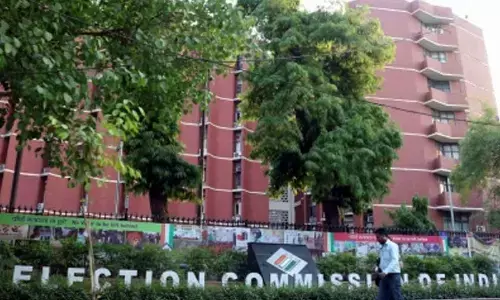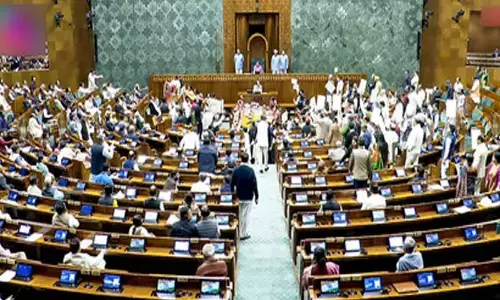Increase consumption by Indians, not foreigners

Representational Image
Chief Economic Adviser Arvind Subramaniam has said that India’s domestic market is small hence it is necessary to focus on increase in exports to jumpstart the economy.
Both the Chief Economic Adviser and J P Morgan do not think that domestic consumption can lead the economy. We need to place their despondency in perspective. Our growth rate has been declining continuously since 2014; while the Sensex has been going up and up. We need to understand the reasons thereof. Pray, what can be the reasons of booming share markets when the economy is going down the hill? The Sensex reflects the profitability of the largest companies in the country. Thus, we may say that the economy is contracting but big industries are booming. The reason for this are the economic policies implemented by the Government
Chief Economic Adviser Arvind Subramaniam has said that India's domestic market is small hence it is necessary to focus on increase in exports to jumpstart the economy. There is no gainsaying that provision of national resources for consumption by our own people is "domestic consumption" while providing the same resources for consumption by foreigners is "export." International bank J P Morgan has agreed with this prognosis and added Government expenditures, especially investments, can help.
Our record of exports in the recent past does not augur well for exports. The United Nations Conference on Trade and Development (UNCTAD) has reported that the exports of China increased by 25 percent in first quarter of 2021 compared to the first quarter of 2019. The exports of South Asia—in which India is the dominant country—declined by 2 per cent in this same period.
Last year in 2020 analysts had expressed great hope that the negative sentiment against China due to the emergence of the Covid virus in Wuhan would lead to a reduction of imports from- and investment into China. It was hoped that India would be able to capture the markets and investments exiting from China. This hope has not only been belied but the opposite is taking place. Instead of capturing the markets opened by the exit of China, we are slipping even from our own markets.
In my assessment our dismal performance is mainly due to the obstructions and rent seeking by our bureaucracy. Indeed, exporters laud the present Government for introducing certain online facilities. At the same time they lament the great harassment they face. One exporter from Mumbai narrated to me that he had to ship a consignment before a particular date. The container reached the port in time. The customs officer, however, would not clear it. He said that he wanted to weigh each of 1600 jerkins of 25 kg each to make sure that the quantity declared was correct.
Now, such weighment would take at least two days. That would lead to the exporter missing the deadline for shipment and he would incur a huge penalty. Left with no other option, he paid bribe of Rs 50,000 and the consignment was cleared promptly. At the same time, the same exporter also lauded the present Government for forcibly retiring number of allegedly corrupt officials and promoting honest officers. The ground reality remains extensively corrupt despite this action on the top as indicated in the above experience. Therefore, the Government will have to take steps to make the ground level bureaucracy responsive and accountable.
This cannot be done from the top alone. A pincer movement with appointment of honest officials from the top combined with people's pressure from the bottom alone will beget smooth exports. If, for example, the harassed exporter could have called the PMO and complained against the customs official, and the PMO could have immediately cleared the consignment, then alone can our exports grow. The hope of an export-led growth will remain a mirage in absence of such an approach.
Both the Chief Economic Adviser and J P Morgan do not think that domestic consumption can lead the economy. We need to place their despondency in perspective. Our growth rate has been declining continuously since 2014; while the Sensex has been going up and up. We need to understand the reasons thereof. Pray, what can be the reasons of booming share markets when the economy is going down the hill? The Sensex reflects the profitability of the largest companies in the country. Thus, we may say that the economy is contracting but big industries are booming.
The reason for this are the economic policies implemented by the Government. Demonetization hit the small industries hard because they operated in cash. Large industries emerged unscathed. The GST facilitated the movement of goods from one state to another. However, it is mostly if not entirely the large industries that engage in interstate trade. The large industries could reach their products across the country. Previously, the difficulties faced by large industries in obtaining "C" forms and negotiating octroi led to small in-state industries securing a competitive advantage.
A curtain manufacturer from Haridwar told me that he was thrown out of the Uttarakhand market because manufacturers from Surat were able to reach their products easily after GST. The huge investments made by the Government in making highways have had the same effect. Small industries use them less than large industries. Thus, the small industries' cost of reaching the goods to the market has declined less while the large industries' cost of reaching the goods to the market has declined more.
The materials and machines used to make highways also created demand of equipment like JCBs and materials like cement and steel that are made by large industries. The killing of small industries has led to reduction of employment and translated into lack of demand in the domestic economy. The despondency of the CEA regarding the lack of domestic demand is, therefore, the direct result to the policies advised by him.
The situation is grim in the services sector as well. According to the India Brand Equity Foundation the Purchase Managers Index for March 2021 declined 54.6 from 55.3 in February. This is hugely serious because the services sector accounts for nearly 80 percent of the economy in the developed countries. We have large numbers of English speaking youth that can export services such as tutorials and music. However, our education system provides incentives such as mid-day meals to youth to encourage them to study in substandard government schools.
The Government is faced with problems on all three fronts: exports-, domestic- and services. Exports are down because of the stranglehold of the bureaucracy. Domestic market is down because of the policies of the Government. Services are down because education system sells certificates instead of teaching. My assessment is that taming the bureaucracy will be difficult given the dependency of the political parties on the same bureaucracy. It may be easier to change the domestic policies.
The direction of investment in infrastructure should be changed in favour of small towns instead of metropolis such as making roads and providing electricity in slums and small towns. The educational system should move from secured employment of teachers to a voucher system wherein the students can buy education from an institution of their choice.
(The author is former professor ofEconomics at IIM, Bengaluru)
















